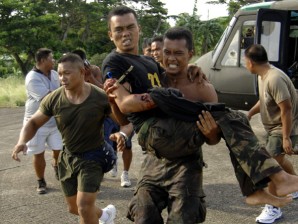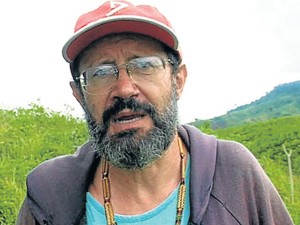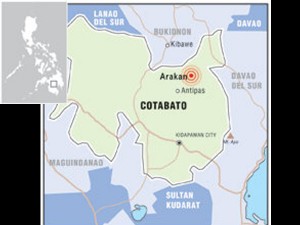19 soldiers slain in Basilan
MILF: Our forces had edge, went for the kill
By Julie AlipalaInquirer Mindanao

‘THEY KEPT COMING’ A soldier carries a wounded comrade airlifted by helicopter from Al-Barka, Basilan, for treatment in Zamboanga City on Tuesday. At least 19 soldiers of the Special Action Forces were killed in a clash with Moro rebels. A survivor of the ambush said they were outnumbered and overwhelmed. AP
The soldiers were running out of magazines preloaded with bullets and yet Moro Islamic Liberation Front (MILF) fighters kept on coming, said a member of the Army’s Special Forces who survived a nine-hour clash in Al-Barka, Basilan province.
The encounter on Tuesday left 19 soldiers dead.
Private First Class Arnel Balili said that while some 90 Moro rebels were advancing, he and 39 other members of the Special Forces had to spend time loading fresh bullets into empty magazines so they could return fire.
The soldiers were overwhelmed. “We were only 40. There were more of them,” Balili, who was among the 11 wounded soldiers, said from a hospital bed in Zamboanga City.
When the smoke cleared, 12 soldiers lay dead, among them, three junior officers.
Twelve other soldiers were wounded, one of whom would later die in a hospital, and 10 more were initially declared missing but an MILF official said six of the missing soldiers were found dead yesterday.
Command conference
The encounter prompted President Benigno Aquino III to call for a command conference with the military and police.
“I have called for a command conference on Friday when the secretary of national defense arrives to precisely tackle the issue,” the President said in a short statement.
The command conference will be held in Camp Aguinaldo in Quezon City.
In a statement, Lieutenant General Raymundo Ferrer, head of the Western Mindanao Command (Westmincom), confirmed that 19 soldiers were killed in the encounter that lasted from 7 a.m. to 4 p.m.
Flags were flown at half-staff in Camp Aguinaldo and all other major military camps in honor of the slain soldiers.
6 rebels killed
Mohagher Iqbal, MILF spokesperson, gave a bigger number of military fatalities. Iqbal said the military lost 22 men and the MILF six members.
In Camp Aquinaldo, the Army spokesperson, Colonel Antonio Parlade, said wounded soldiers reported that they saw their comrades captured alive after running out of ammunition.
“They were captured and then killed. So they murdered the six,” Parlade said.
He said one soldier remained missing and a wounded soldier was rescued by Scout Rangers.
Iqbal said no soldier was being held hostage in Al-Barka.
The bodies of the six soldiers had been retrieved by members of the Al-Barka police, he said.
Trap
Lieutenant Colonel Randolph Cabangbang, the spokesperson of Westmincom based in Zamboanga City, said the soldiers were sent to Al-Barka to check reports that armed men, including Dan Laksaw Asnawi, were holding kidnap victims.
Asnawi was among those involved in the beheading of 14 Marines during a 2007 clash, also in Al-Barka. He was arrested in the aftermath of the beheading but escaped from the Basilan provincial jail in December 2009 with 30 other inmates.
Cabangbang said the armed men indeed included Asnawi, who the MILF confirmed was an MILF commander under the 114th Base Command.
Silent, empty road
Balili said that while his group was on its way to Barangay Cambug at around 6 a.m. to check on the presence of armed men, the surroundings were eerily silent and the road was almost empty.
He said his group met only four people along the way and had no idea that the armed men were just nearby. “We were almost surrounded by then,” he said.
When the firing started, Balili said the soldiers were overwhelmed by the sheer number of the rebels. “We were not running out of bullets. But we had to load them into empty magazines to be able to continue firing,” he said.
Rebels knew terrain
Iqbal said only a platoon of MILF rebels fought the soldiers in Al-Barka. A platoon has about 30 men.
He said the MILF recovered 22 firearms—four M-203 rifles, five machine guns and 13 M-16 rifles from the soldiers.
Iqbal said the soldiers were not even outnumbered. “It so happened that our forces were better positioned and they knew the terrain,” he said.
Cabangbang acknowledged that the soldiers had problems with the terrain. He also said that some of the soldiers sent to the area were still undergoing scuba training, which has nothing to do with land combat.
Cabangbang said reinforcements were sent to the area to help the embattled Special Forces soldiers. The military also pounded the position of the rebels until late evening while the bodies of the slain soldiers remained uncollected from the encounter site.
Asked why it took the military 18 hours to retrieve the bodies, Cabangbang said the area had to be secured first.
He said Scout Rangers were then sent deeper into the area to retrieve the bodies. These had to be carried to a pickup area on foot.
The bodies were then flown to Tabiawan in Isabela City before they were shipped to Zamboanga City.
At about 10 a.m., the bodies of the soldiers were unloaded from a Navy boat at the Majini Pier inside the Naval Forces Westmin headquarters as the Army chief, Lieutenant General Arturo Ortiz, was having a closed-door meeting with Ferrer.
Blame game
Iqbal said the military should be faulted for what happened in Al-Barka.
“It was a deliberate attack by the military and we are filing a protest-complaint before the International Monitoring Team and ceasefire committees against the military for truce violation,” he said.
Iqbal said the Al-Barka encounter showed that the military had no regard for the peace process. He cited the October 15 clash in Payao, Zamboanga Sibugay, which he said was also prompted by a military attack.
No intrusion
In Al-Barka, the military knew it was assaulting an MILF camp and not just a temporary position of the MILF, Iqbal said.
Cabangbang said the troops did not intrude on a rebel stronghold and were about 4 kilometers from it when they were fired upon by the rebels, prompting the troops to fight back.
The military operation was supposed to be “strike and withdraw,” he said.
In a statement, Ferrer said the military was not at fault.
“It is apparent that the encounter took place outside of the MILF’s area of temporary stay,” he said.
Ferrer said this belied the MILF statement that the military violated the ceasefire accord. On the contrary, he said the MILF should be held liable for what occurred on Tuesday.
As of Wednesday, some 1,500 civilians had left their homes because of shelling by the military, said Basilan Vice Gov. Al Rasheed Sakalahul.
The 11,000-strong MILF has waged a rebellion since 1978 for an independent Islamic state in Mindanao.
Malaysian-brokered peace talks between the rebels and the Philippine government received a major boost in August when President Aquino met MILF chair Murad Ebrahim in Tokyo to bolster the negotiations.
The rebels, however, rejected a government proposal for Muslim autonomy when talks resumed a few weeks later in Malaysia but they said they would continue with the talks.
The rebellion has left about 150,000 people dead, with most of the deaths occurring in the 1970s when an all-out war raged.Reposted From Julie Alipala of Philippine Daily Inquirer



